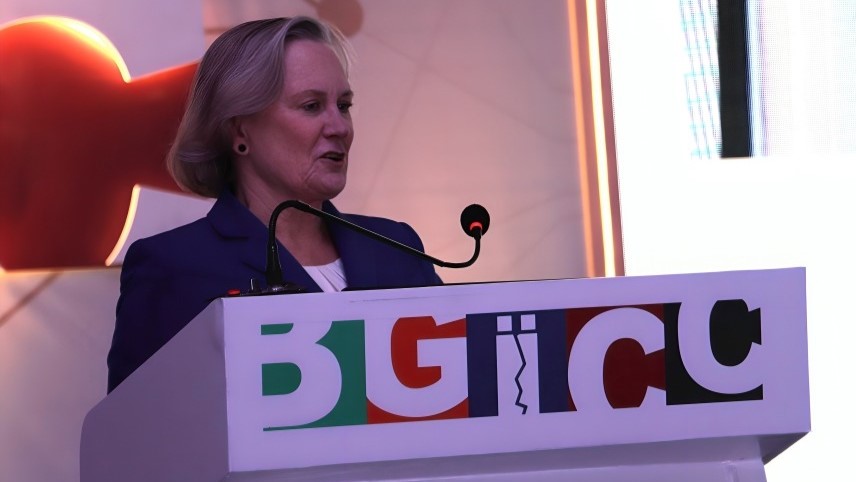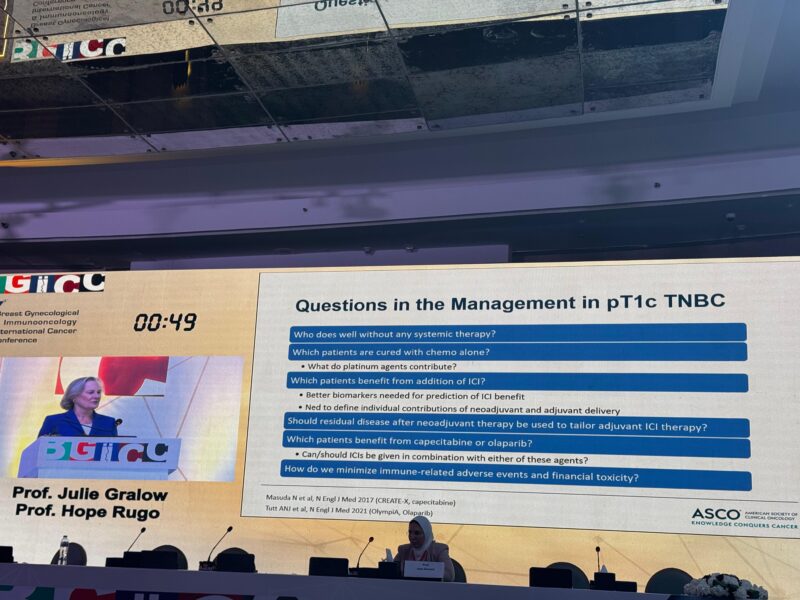
Debate Highlights by Julie Gralow: Is There a Role for Immunotherapy in Early-Stage TNBC?
During 17th Breast, Gynecological & Immuno-Oncology International Cancer Conference, Dr. Julie Gralow presented a compelling discussion on the management of pT1c triple-negative breast cancer (TNBC) and explored whether immune checkpoint inhibitors (ICIs) have a role in early-stage disease.
Key Points from the Debate
Why Consider Immunotherapy?
- TNBC is aggressive, with high recurrence and mortality rates.
- Pathologic complete response (pCR) rates range from 30–50% with neoadjuvant chemotherapy, and achieving pCR is associated with better survival.
- Immune checkpoint inhibitors, like pembrolizumab, have shown promise in improving outcomes in high-risk early-stage TNBC.
Evidence from KEYNOTE-522:
- Trial Design: Pembrolizumab + chemotherapy pre-surgery, followed by pembrolizumab post-surgery.
Results:
- Improved pCR: 64.8% vs. 51.2%.
- Better 5-year event-free survival (EFS): 81.2% vs. 72.2%.
- Benefit observed across nodal status, tumor size, and PD-L1 expression.
- The Gray Zone: T1cN0 TNBC
Guidelines differ for this subset:
- NCCN (2023): Adjuvant chemotherapy.
- ASCO (2023): Neoadjuvant chemotherapy.
- T1cN0 TNBC patients are poorly represented in trials, leaving questions about optimal treatment strategies.
Questions Raised by Dr. Gralow
– Who benefits from ICIs, and who does well with chemotherapy alone?
– How can we better identify patients likely to respond to ICIs?
– What role do platinum agents play in TNBC treatment?
– Should residual disease post-neoadjuvant therapy guide adjuvant strategies?
– Can ICIs be effectively combined with other agents like capecitabine or olaparib?
Future Directions
- Biomarkers for better prediction of ICI response.
- Exploration of ICI monotherapy in tumors with high tumor-infiltrating lymphocytes (TILs).
- Re-evaluating subsets like ER-low and HER2-low tumors, which may overlap with TNBC biology.
Takeaway
Dr. Gralow emphasized that immunotherapy holds potential in early-stage TNBC, but significant questions remain regarding its role in specific subgroups like T1cN0. She called for further studies to refine patient selection, optimize treatment combinations, and minimize toxicity.

Further Reading:
BGICC 2025: Hear from Global Oncology Leaders
The 17th Annual BGICC Conference Kicks Off in Cairo, Egypt with 5,000 Attendees
How Egypt is closing the gap in breast cancer care: Dr. Hesham El-Ghazaly leads the conversation
-
ESMO 2024 Congress
September 13-17, 2024
-
ASCO Annual Meeting
May 30 - June 4, 2024
-
Yvonne Award 2024
May 31, 2024
-
OncoThon 2024, Online
Feb. 15, 2024
-
Global Summit on War & Cancer 2023, Online
Dec. 14-16, 2023
